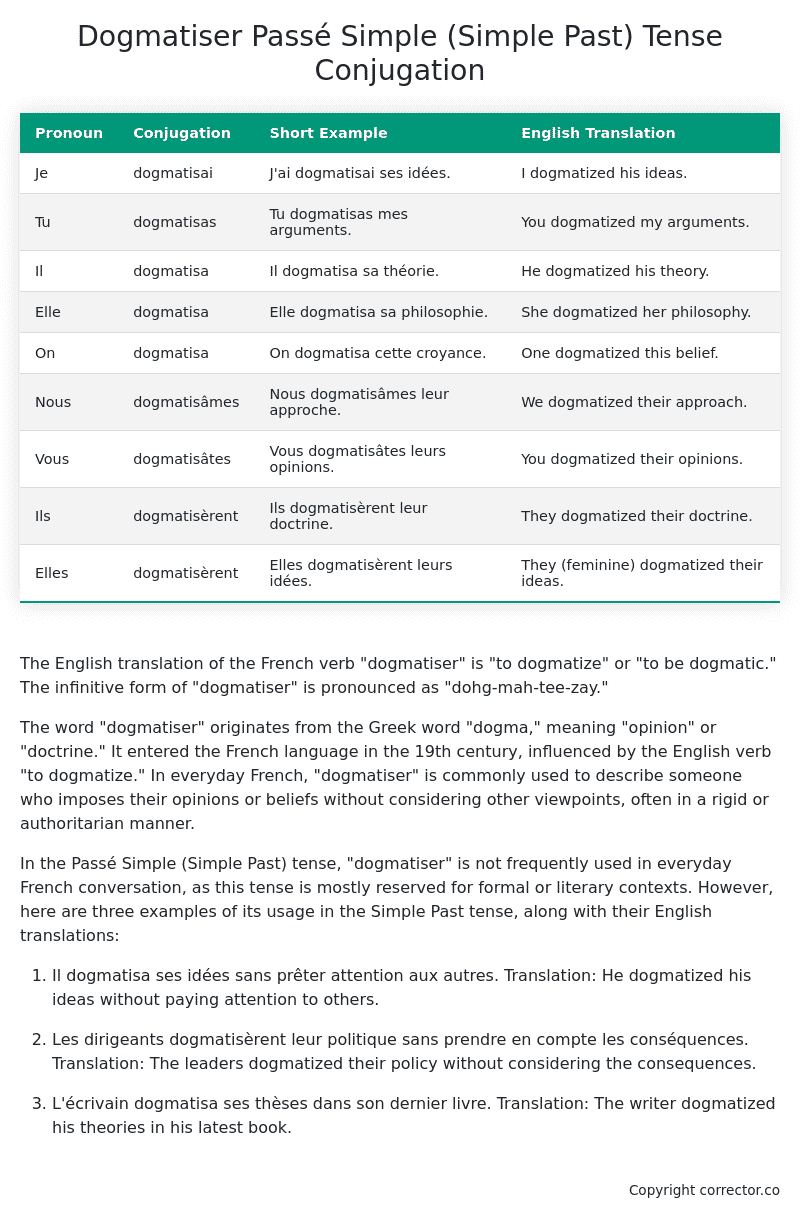Passé Simple (Simple Past) Tense Conjugation of the French Verb dogmatiser
Introduction to the verb dogmatiser
The English translation of the French verb “dogmatiser” is “to dogmatize” or “to be dogmatic.” The infinitive form of “dogmatiser” is pronounced as “dohg-mah-tee-zay.”
The word “dogmatiser” originates from the Greek word “dogma,” meaning “opinion” or “doctrine.” It entered the French language in the 19th century, influenced by the English verb “to dogmatize.” In everyday French, “dogmatiser” is commonly used to describe someone who imposes their opinions or beliefs without considering other viewpoints, often in a rigid or authoritarian manner.
In the Passé Simple (Simple Past) tense, “dogmatiser” is not frequently used in everyday French conversation, as this tense is mostly reserved for formal or literary contexts. However, here are three examples of its usage in the Simple Past tense, along with their English translations:
-
Il dogmatisa ses idées sans prêter attention aux autres.
Translation: He dogmatized his ideas without paying attention to others. -
Les dirigeants dogmatisèrent leur politique sans prendre en compte les conséquences.
Translation: The leaders dogmatized their policy without considering the consequences. -
L’écrivain dogmatisa ses thèses dans son dernier livre.
Translation: The writer dogmatized his theories in his latest book.
Table of the Passé Simple (Simple Past) Tense Conjugation of dogmatiser
| Pronoun | Conjugation | Short Example | English Translation |
|---|---|---|---|
| Je | dogmatisai | J’ai dogmatisai ses idées. | I dogmatized his ideas. |
| Tu | dogmatisas | Tu dogmatisas mes arguments. | You dogmatized my arguments. |
| Il | dogmatisa | Il dogmatisa sa théorie. | He dogmatized his theory. |
| Elle | dogmatisa | Elle dogmatisa sa philosophie. | She dogmatized her philosophy. |
| On | dogmatisa | On dogmatisa cette croyance. | One dogmatized this belief. |
| Nous | dogmatisâmes | Nous dogmatisâmes leur approche. | We dogmatized their approach. |
| Vous | dogmatisâtes | Vous dogmatisâtes leurs opinions. | You dogmatized their opinions. |
| Ils | dogmatisèrent | Ils dogmatisèrent leur doctrine. | They dogmatized their doctrine. |
| Elles | dogmatisèrent | Elles dogmatisèrent leurs idées. | They (feminine) dogmatized their ideas. |
Other Conjugations for Dogmatiser.
Le Present (Present Tense) Conjugation of the French Verb dogmatiser
Imparfait (Imperfect) Tense Conjugation of the French Verb dogmatiser
Passé Simple (Simple Past) Tense Conjugation of the French Verb dogmatiser (You’re reading it right now!)
Passé Composé (Present Perfect) Tense Conjugation of the French Verb dogmatiser
Futur Simple (Simple Future) Tense Conjugation of the French Verb dogmatiser
Futur Proche (Near Future) Tense Conjugation of the French Verb dogmatiser
Plus-que-parfait (Pluperfect) Tense Conjugation of the French Verb dogmatiser
Passé Antérieur (Past Anterior) Tense Conjugation of the French Verb dogmatiser
Futur Antérieur (Future Anterior) Tense Conjugation of the French Verb dogmatiser
Subjonctif Présent (Subjunctive Present) Tense Conjugation of the French Verb dogmatiser
Subjonctif Passé (Subjunctive Past) Tense Conjugation of the French Verb dogmatiser
Subjonctif Imparfait (Subjunctive Imperfect) Tense Conjugation of the French Verb dogmatiser
Subjonctif Plus-que-parfait (Subjunctive Pluperfect) Tense Conjugation of the French Verb dogmatiser
Conditionnel Présent (Conditional Present) Tense Conjugation of the French Verb dogmatiser
Conditionnel Passé (Conditional Past) Tense Conjugation of the French Verb dogmatiser
Conditionnel Passé II (Conditional Past II) Tense Conjugation of the French Verb dogmatiser
L’impératif Présent (Imperative Present) Tense Conjugation of the French Verb dogmatiser
L’impératif Passé (Imperative Past) Tense Conjugation of the French Verb dogmatiser
L’infinitif Présent (Infinitive Present) Tense Conjugation of the French Verb dogmatiser
L’infinitif Passé (Infinitive Past) Tense Conjugation of the French Verb dogmatiser
Le Participe Présent (Present Participle) Tense Conjugation of the French Verb dogmatiser
Le Participe Passé (Past Participle) Tense Conjugation of the French Verb dogmatiser
Struggling with French verbs or the language in general? Why not use our free French Grammar Checker – no registration required!
Get a FREE Download Study Sheet of this Conjugation 🔥
Simply right click the image below, click “save image” and get your free reference for the dogmatiser Passé Simple tense conjugation!

Dogmatiser – About the French Passé Simple (Simple Past) Tense
Formation
Usage
Narration
Historical Context
Interactions with other tenses
Passé Composé
Imparfait
Conditional and Subjunctive
Summary
I hope you enjoyed this article on the verb dogmatiser. Still in a learning mood? Check out another TOTALLY random French verb conjugation!


